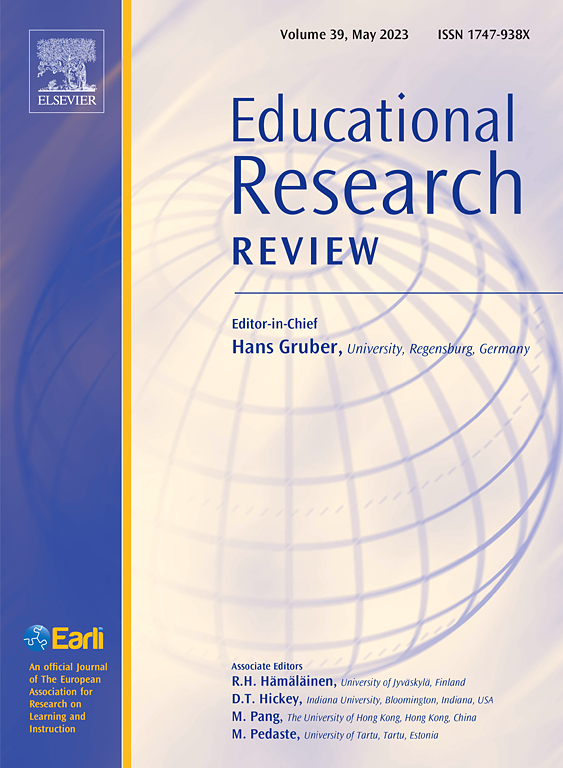教师在线专业学习:系统的文献综述
IF 10.6
1区 教育学
Q1 EDUCATION & EDUCATIONAL RESEARCH
引用次数: 0
摘要
在线专业学习对于教师的持续专业学习变得越来越重要,特别是由于最近的全球中断,COVID-19大流行加速了远程学习的采用。然而,教师在线专业学习(TOPL)计划的有效设计和实施在不同的教育背景下既面临机遇也面临挑战。为了满足全面和最新综合的需求,本研究使用PRISMA框架系统地审查了来自七个数据库的82篇同行评议文章(2013-2023)。我们的分析涉及研究目的、研究背景、理论框架、教学特点、学习评价、研究方法和TOPL面临的挑战等七个研究问题。调查结果显示,全球教师参与在线专业学习的人数不断增加,但也凸显了重大的研究差距——特别是在高等教育水平、全球南方地区,以及在促进跨国合作方面。大多数TOPL计划强调自我注册和个人学习,最近的研究趋势集中在加强理论基础,创新的教学模式,反馈机制和证书识别。在方法上,描述性和推断性统计,以及定性内容分析,主导了该领域。重要的是,这篇综述将TOPL概念化为一个动态的生态系统,由多个层面的相互作用因素形成,包括技术、制度、政策和个人维度,并倡导在微观、中观和宏观层面探索TOPL过程。本综述说明了建立有弹性和公平的TOPL系统以适应未来挑战的必要性,并提出了可操作的建议,以推进教师在线专业学习的研究和实践。本文章由计算机程序翻译,如有差异,请以英文原文为准。
Teacher online professional learning: A systematic literature review
Online professional learning has become increasingly vital for teachers' continuous professional learning, especially with the accelerated adoption of remote learning due to the recent global disruptions, the COVID-19 pandemic. However, the effective design and implementation of teacher online professional learning (TOPL) programs present both opportunities and challenges across diverse educational contexts. Addressing the need for a comprehensive and up-to-date synthesis, this study systematically reviewed 82 peer-reviewed articles (2013–2023) from seven databases using the PRISMA framework. Our analysis addressed seven research questions concerning research purposes, study contexts, theoretical frameworks, pedagogical features, learning evaluation, research methodologies, and ongoing challenges in TOPL. The findings reveal growing teacher engagement in online professional learning worldwide, but also highlight significant research gaps—particularly at the tertiary level, in Global South regions, and in fostering cross-country collaboration. Most TOPL initiatives emphasize self-enrollment and individual learning, with recent research trends focusing on strengthening theoretical underpinnings, innovative pedagogical models, feedback mechanisms, and credential recognition. Methodologically, descriptive and inferential statistics, alongside qualitative content analysis, dominate the field. Importantly, this review conceptualizes TOPL as a dynamic ecosystem shaped by interacting factors at multiple levels—including technological, institutional, policy, and individual dimensions—and advocates for exploring TOPL processes at the micro, meso, and macro levels. Illustrating the need to build resilient and equitable TOPL systems capable of adapting to future challenges, this review concludes with actionable recommendations to advance research and practice in teacher online professional learning.
求助全文
通过发布文献求助,成功后即可免费获取论文全文。
去求助
来源期刊

Educational Research Review
EDUCATION & EDUCATIONAL RESEARCH-
CiteScore
19.40
自引率
0.90%
发文量
53
审稿时长
57 days
期刊介绍:
Educational Research Review is an international journal catering to researchers and diverse agencies keen on reviewing studies and theoretical papers in education at any level. The journal welcomes high-quality articles that address educational research problems through a review approach, encompassing thematic or methodological reviews and meta-analyses. With an inclusive scope, the journal does not limit itself to any specific age range and invites articles across various settings where learning and education take place, such as schools, corporate training, and both formal and informal educational environments.
 求助内容:
求助内容: 应助结果提醒方式:
应助结果提醒方式:


